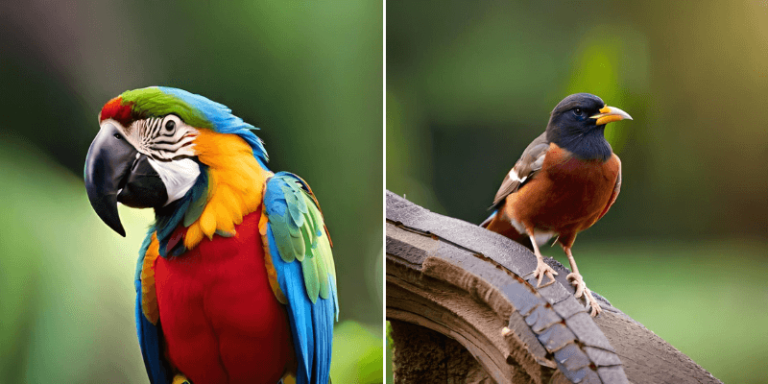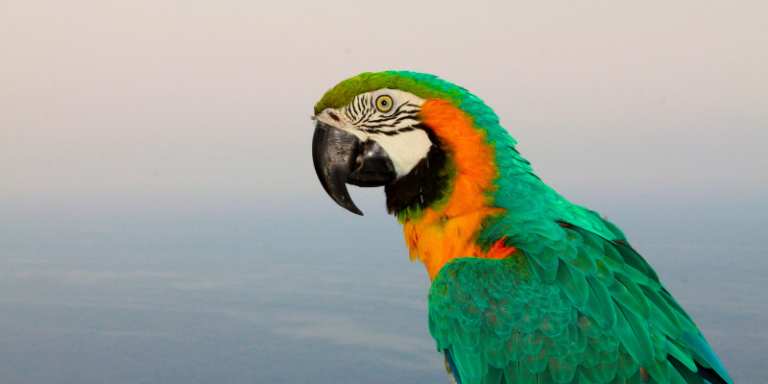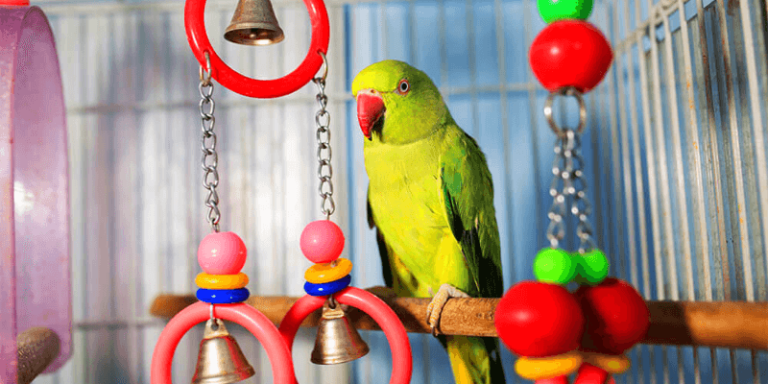Tips to keep your parrot happy
When it comes to boredom, birds and young toddlers have a lot in common. Parrots and boredom can result in a bird that is grumpy, destructive, and difficult to be around if you don’t keep them continually occupied and entertained. Because parrots are such intelligent creatures, taking care of cockatoos, macaws, African greys, and other pet birds may appear difficult. But it doesn’t have to be a difficult chore to keep a parrot from getting bored. Fortunately, birds are similarly similar to young children in that they can be amused rather easily with forward planning.
For bird fans of all ages, parrots make ideal pets since they are colourful, loveable, and laid-back. Here are a few simple methods to give your parrot extra love and attention, whether you’re a new parrot parent or you’ve had them for a while.
1. Toys should be often changed

Particularly while you’re not home, your bird’s cage needs to be a tidy, entertaining, and stimulating environment. Without enough cerebral stimulation, birds may engage in damaging behaviours like plucking feathers and even develop health issues. As bird toys tend to be quite pricey, many bird owners choose to store a “stash” of different kinds of toys that they periodically rotate into the cage. As long as the food is not perishable, popular choices like puzzles and foraging toys can be loaded with tasty chunks of the parrot diet for them to find. Also, don’t forget to clean the toys inside each switch that your bird uses. Additionally, birds like objects with vivid colours, intriguing textures, and sparkling surfaces.
2. Give them a variety of foods.
Feeding your bird a healthy, well-balanced meal is one of the best things you can do for its mental and physical health in terms of parrot care. The range of fresh fruits and vegetables, novel mashed foods, and different seed and pellet mixtures are all included in this. The lovebird, parakeet, and parrot diets available in the market are fantastic. They come in a variety of blends with mouthwatering flavours, foraging-stimulating textures, and premium ingredients that will make every parrot parent proud of their bird’s diet and get them thrilled about mealtimes.
3. Allow them to exercise frequently.
Wild birds have unrestricted access to the air, food, and environment. Pet birds don’t have access to the same environment, so it’s critical to give them a lot of physical activity to keep them healthy and psychologically engaged. Allowing your bird to play outside of its cage might provide a change of scenery. Additionally, owners of birds should provide their pets with plenty of room within their cages for exercise. Your bird can expend surplus energy in healthy and beneficial ways by playing with ropes, ladders, and other physically demanding toys.
4. Play together for some time.

The majority of birds are sociable creatures, therefore it’s important to provide them with the appropriate level of company and bonding time for their mental health. You are your parrot’s primary source of social connection if you don’t have a mate for it. Lack of socialisation and bonding time can cause your parrot to get depressed or act out for attention. If owners want their birds to be content and well-behaved, they must set out time each day to interact with and play with them. Boredom can be avoided and your bond can be strengthened by engaging in games and conversation with your bird.
Make sure you handle your bird properly, in a “friends-only” manner that doesn’t unintentionally convey flirtatiousness, otherwise you risk having a sexually dissatisfied bird. Spending time trick-training your bird is a wonderful additional approach to foster socialisation and bonding. Birds are extremely bright and enjoy expanding their knowledge. Working on cute small tricks keeps your bird intellectually active, and the extra treats you give as rewards will give it even more stimulation.
5. Make a bird playlist to listen to while you are away.
Nobody who owns a pet can always be at home, and even then, there are occasions when you can’t spend time with your pet bird. When this occurs, think about playing some music or playing something on TV to comfort your bird. A fantastic approach to provide your bird low-key stimulation while you are gone is to leave on colourful children’s programming or make a specific playlist of songs that your bird enjoys. New sights and sounds give your bird a lot of external stimulation. Owners of cockatoos, macaws, lovebirds, and parakeets frequently keep track of the radio shows and musical tastes of their pets so they can preserve them for use while they are away from home.
6. Maintaining your bird’s activity doesn’t have to be difficult
Some parrot species have intelligence levels that are comparable to those of five-year-old kids, and they exhibit a startlingly wide spectrum of emotions. The good news is that keeping your bird cognitively active without wearing yourself out is comparatively easy. What is parrot care, for example, is a question that many new bird owners have. In addition, they can inquire, “What are the best toys for my cockatoo?” Keeping a parrot from getting bored could feel like too much stress to handle on top of everything else. The best approach, though, is to always keep in mind that variation makes life more interesting. All you need to do to keep your parrot happy is to think beyond the box, whether you’re looking for toys to buy, food to try, or skills to learn.
7. Grooming
The ability to maintain good grooming is crucial for your bird’s general health since it promotes the best possible condition for its skin and feathers. Giving your bird the chance to regularly bathe, clipping its wings and nails, and filing its beak as necessary are all included in grooming. To learn the proper procedures if you are not familiar with these processes, consult a licensed avian veterinarian. As you get to know your bird, you’ll learn about its bathing preferences. This could entail opening the faucet so they can splash around in the water, spraying your bird with a clean water spray bottle, or giving them a shallow dish of water to bathe in that resembles an outdoor birdbath.
Conclusion
You want to do everything in your power to keep your bird happy and healthy because he or she is a member of your family. Although a bird’s demands are not particularly complex, many bird owners fail to provide for some of the most basic yet crucial requirements for their pet. You can take measures to avoid despair, boredom, and other undesirable side effects by taking the time to educate yourself about and become aware of their fundamental needs.
Parrots are intelligent, social and inquisitive creatures that require care and attention to stay healthy and happy. With a few simple tips, you can ensure that your parrot is content and lives a long, healthy life. It’s important to provide a spacious and stimulating environment for your parrot, feed them a variety of healthy foods, allow them the opportunity to interact with other parrots, and give them plenty of attention. It’s also important to provide them with plenty of toys and foraging activities to keep them occupied and mentally stimulated. Above all, it’s important to remember that parrots are social animals and need lots of love, attention, and interaction from their owners to stay happy and healthy. With the right care and attention, you can ensure that your parrot is happy and content for many years to come.




